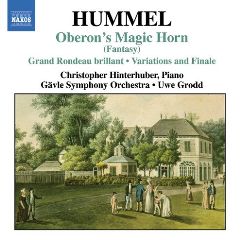Hummel - Oberon's Magic Horn (2007)
Hummel - Oberon's Magic Horn (2007)

1. Le retour à (de) Londres, rondo brillant in F, for piano and orchestra, Op.127 14:51 2. Variations on a theme from a Berlin Singspiel 'Das Fest der Handwerker' in Bb, for piano and orchestra, Op.115 15:58 3. Oberons Zauberhorn, fantasy for piano and orchestra, Op.116 18:47 4. Variations in F, for piano and small orchestra, Op.97 17:07 Christopher Hinterhuber – piano Gävle Symphony Orchestra Uwe Grodd – conductor
This disc of four of Johann Nepomuk Hummel's works for piano and orchestra is part of a joint project of Naxos and Artaria Editions, the publishing company revived by musicologist Allan Badley and Naxos' Klaus Heymann to bring back some forgotten works from the late eighteenth/early nineteenth century. For those who already know and like the music of Hummel, this recording will be of interest just to compare to the series made by Howard Shelley for Chandos in the early 2000s. In those recordings, Shelley was soloist and conductor, and used scores prepared by himself and Stephen Hogger. Here pianist Christopher Hinterhuber and conductor Uwe Grodd use scores prepared by Badley. For those who are less familiar with Hummel, this Naxos release is a great budget alternative to the Chandos series. The similarities in these works of Hummel's to both Mozart's late piano concertos and Beethoven's early ones are obvious. The way he develops themes, modulates through keys, uses Alberti bass, references minuets and other dance forms in the Variations, Op. 97 -- the last work on the disc, yet the earliest work chronologically -- are all hallmarks of the Classical era. In other, later pieces here, Hummel also adds more florid passagework than either of those other composers, leaning toward what appears later in Chopin and Liszt, trying to show off his expertise in performance and bringing him closer to the Romantic era. Both Le retour de Londres and Oberons Zauberhorn are more imaginative than the sets of variations. Oberons Zauberhorn is a fantasia on the horn call theme from Weber's opera Oberon, taking it through a series of contrasting episodes, including a storm to rival those in Beethoven's Pastoral Symphony and Rossini's William Tell Overture, before transforming it into a new theme for horn and piano duet over the orchestra. Le retour and the Variations, Op. 115, both have really serious, slow introductions, which, mood-wise, don't prepare the listener for the lightly dancing, insouciant music that follows. Hinterhuber, Grodd, and the Gälve Symphony do a great job maintaining that balance between the eras. They all give shape and feeling to the music, but Hinterhuber doesn't get carried away with virtuoso showmanship. His technical ease through the fancy fingerwork passages can still be impressive, but the music's intensity is fully in line with what surrounds it. These works are not as substantial as Hummel's piano concertos, but they do give insight into his style of composing and performance and into the music of the period. --- Patsy Morita, AllMusic Review
download (mp3 @320 kbs):
yandex 4shared mega mediafire zalivalka cloudmailru ge.tt








